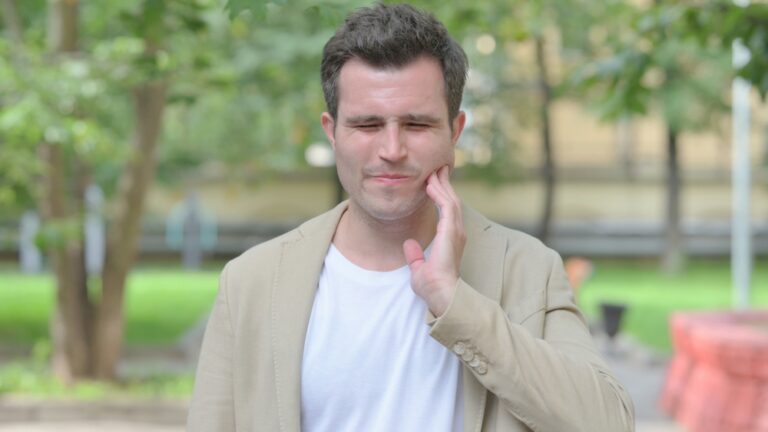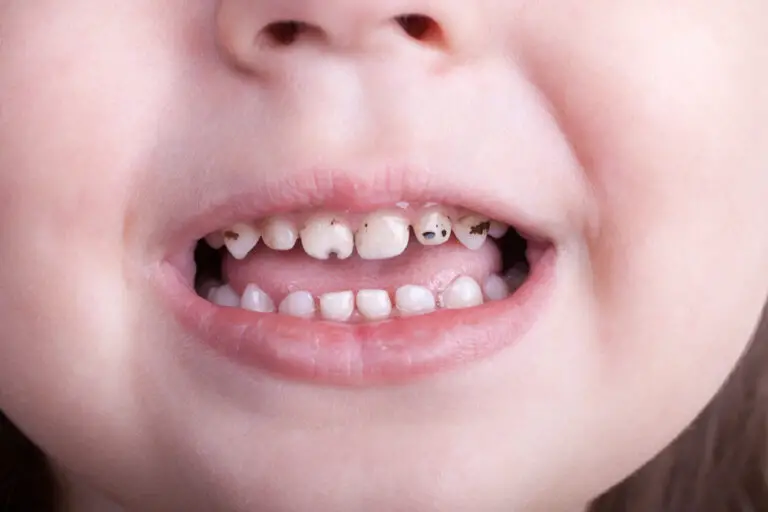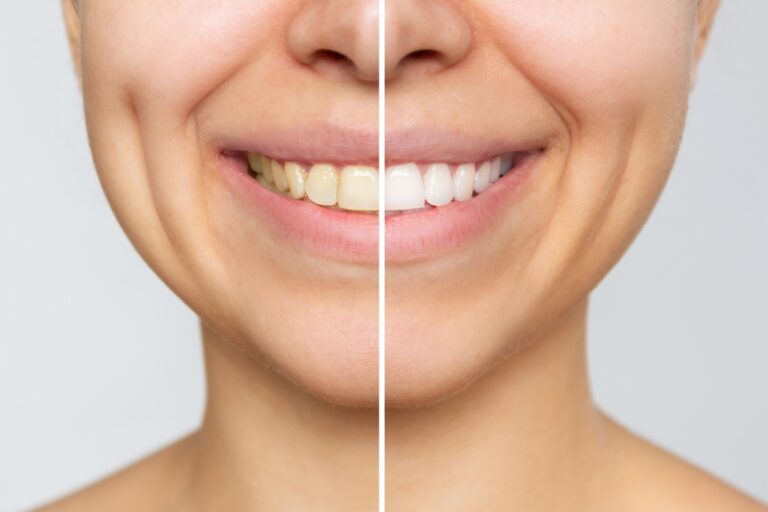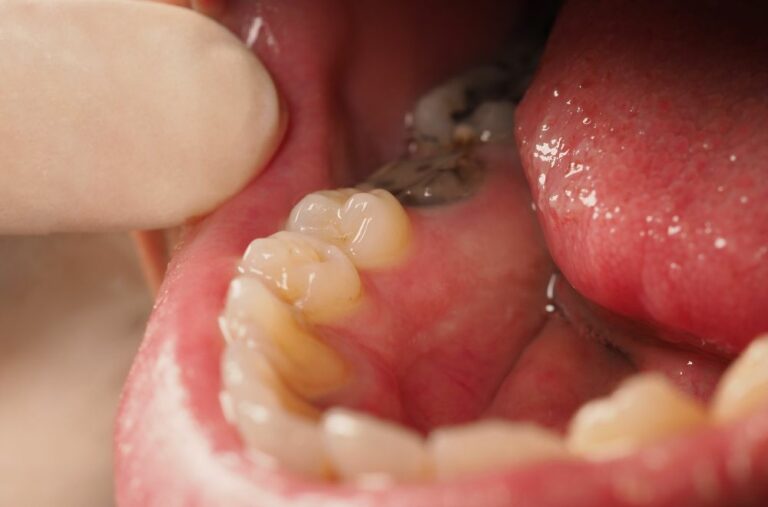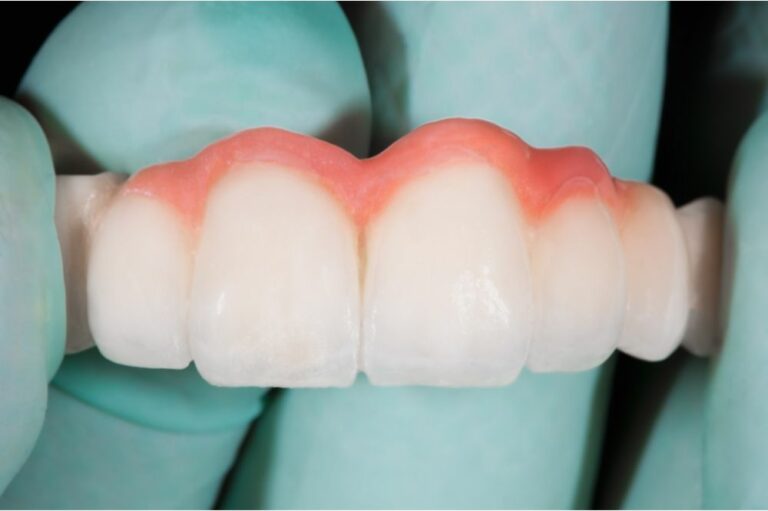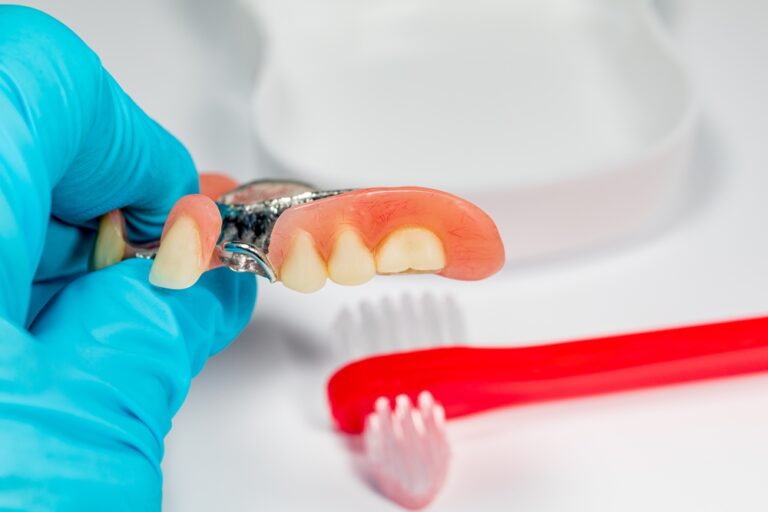Have you noticed the thinning of your dental bones? Are your teeth shifting and loosening from the roots? If yes, then you are experiencing dental bone loss!
Dental bone loss is a common condition that affects almost 25% of adults over the age of 60 in the US. But, if you aren’t careful with your oral health, it can also occur in your early twenties and thirties.
The good news is you can slow it down. In today’s post, we will discuss exactly how to stop dental bone loss and prevent it. So, let’s dive in and preserve your precious smile!
What Exactly Is Dental Bone Loss?
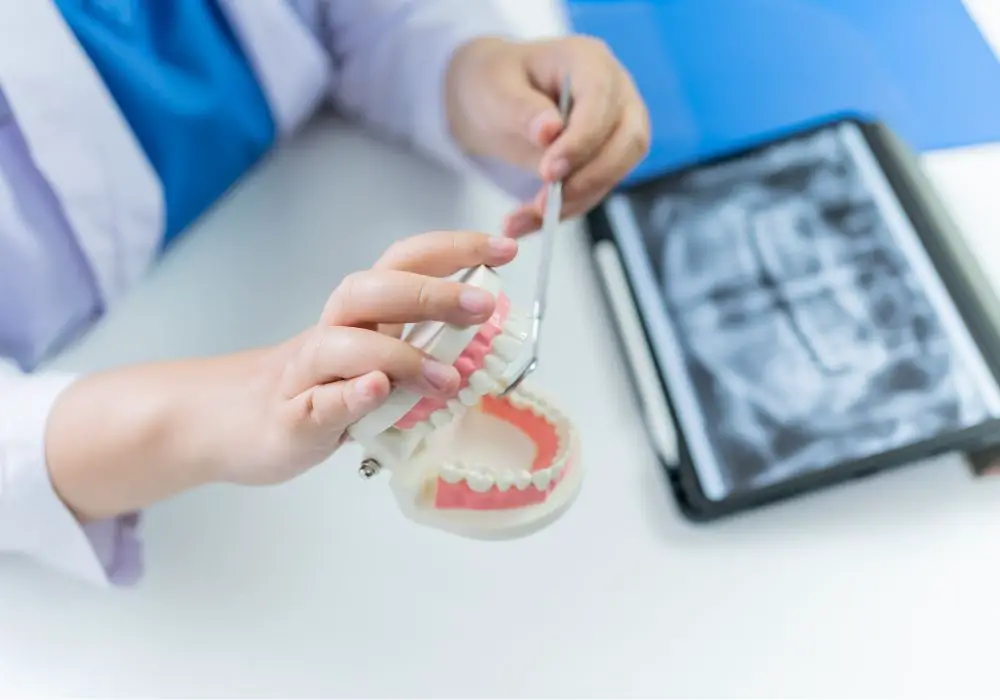
Dental bone loss occurs when the jawbone and teeth-supporting bone structures start to recede. Your dental bones lose their density and weaken over time. If left untreated, this condition can lead to permanent tooth loss.
Fortunately, there are many ways to identify dental bone loss before it reaches such an extremity. If your dentist suspects it during routine checkups, he will conduct X-rays and CT scans for confirmation.
He’ll also manually examine your teeth for these symptoms:
- Loose or shifting teeth
- Receding gums
- Swollen, red, or tender gums
- Bad breath (halitosis)
- Pus or drainage
- Difficulty in chewing or biting
- Spaces between teeth
Please note that sharp pain and extreme sensitivity are also symptoms of dental bone loss. If you experience any of these, it’s best to consult the professional immediately.
Causes of Dental Bone Loss
Most people claim dental bone loss to be an age factor. But the truth is it can occur to anyone at any age. So, if you’re experiencing dental bone loss, don’t blame age and check for one of the following culprits:
1. Gum Disease
Also called periodontal disease, almost 47% of adults in the US experience gum disease once in their lifetime. It is triggered by plaque buildup and poor oral hygiene.
When your teeth aren’t cleaned properly, germs attack and release harmful toxins in your mouth. This leads to a bacterial infection in your gums called gingivitis. You’ll experience red, swollen gums at this stage.
If left untreated, gingivitis worsens and transforms into periodontitis. In this condition, the germs spread below the gum line and attack the teeth-supporting structures. Your bone tissues will start to recede – causing the teeth to loosen, shift, and eventually fall out.
2. Osteoporosis
The bone tissues in our body break down after some time and are replaced by newer ones. But when the rate of bone loss exceeds the rate of bone regeneration, the person is known to have osteoporosis.
This occurs mainly because of dietary issues. If the person doesn’t consume enough vitamin D and calcium, the bone tissues can’t be replaced at the same time. This makes the bone structures weak and brittle – hence, increasing the risk of dental bone loss.
3. Tooth Extraction
Although this is rare, some people experience dental bone loss due to tooth extraction. What happens is that when the tooth is pulled out, the socket becomes empty. This means the alveolar bone (that holds the teeth in place) doesn’t have anything to hold onto.
It also doesn’t receive any stimulation through chewing action. This causes the bone to recede and deteriorate over time. To prevent this, most dentists perform socket preservation (graft bone surgery). But if your dentist didn’t perform it, you have a higher risk of dental bone loss.
4. Physical Trauma
If you’ve been in a physical fight or an accident where your jaw crashed against something, you have experienced physical trauma. This can result in missing teeth and fractured, dislocated, or broken jaw.
5. Hormonal Changes
During pregnancy and menopause, the hormones are shifting rapidly in a woman’s body. This can lower bone density and make your dental bones brittle.
Is Dental Bone Loss Reversible?
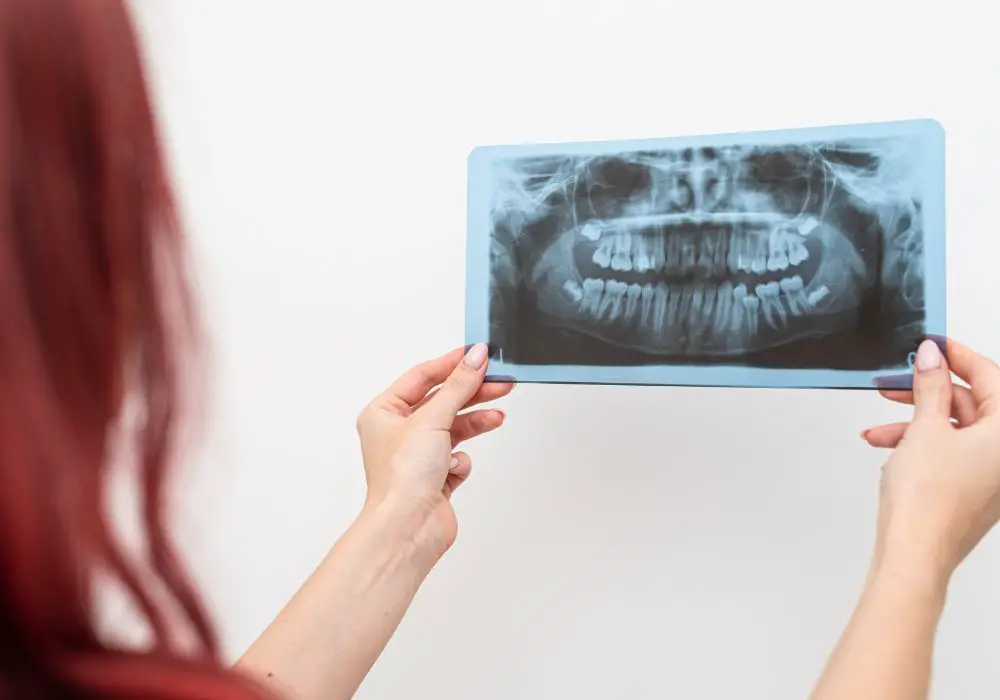
No, dental bone loss is not reversible. It doesn’t matter whether you have 10%, 50%, or 90% bone loss in your teeth. Once the process has started, it can’t be reversed naturally – just like lost bones don’t grow on their own.
But it is certainly possible to slow down dental bone loss and even stop it from progressing further. You will need to make a few lifestyle changes to do that (more on this later!). For a more powerful and immediate effect, you can also opt for dental treatments like:
1. Dental Bone Grafting
Bone grafting surgery is used to strengthen your jawbone and encourage new bone growth. In this procedure, your dentist will cut the gum tissue (where the tooth is missing) and place a bone graft material.
The graft can be taken from your body, another human, an animal, or even made from synthetic materials. Once it’s placed inside the gum tissue, the dentist will sew it up and your dental bone will start healing after 3 to 9 months.
2. Dental Implants
A missing tooth can trigger the dental bone loss of other healthy teeth. It can also cause difficulty in biting and chewing. So, if you have a missing tooth, it’s best to get it replaced through a dental implant.
In this treatment, the dentist will place an artificial root (a screw-like device made from metal) in the gum tissue and cover it with a crown. This will feel just like your natural tooth!
3. Composite Bonding
When your teeth have experienced considerable bone loss, composite bonding can be used to slow down the process. It involves filling the spaces and gaps between the teeth with a composite-like material.
This not only reshapes your teeth but also strengthens them. But it doesn’t stimulate new bone growth.
How to Stop Dental Bone Loss Naturally?
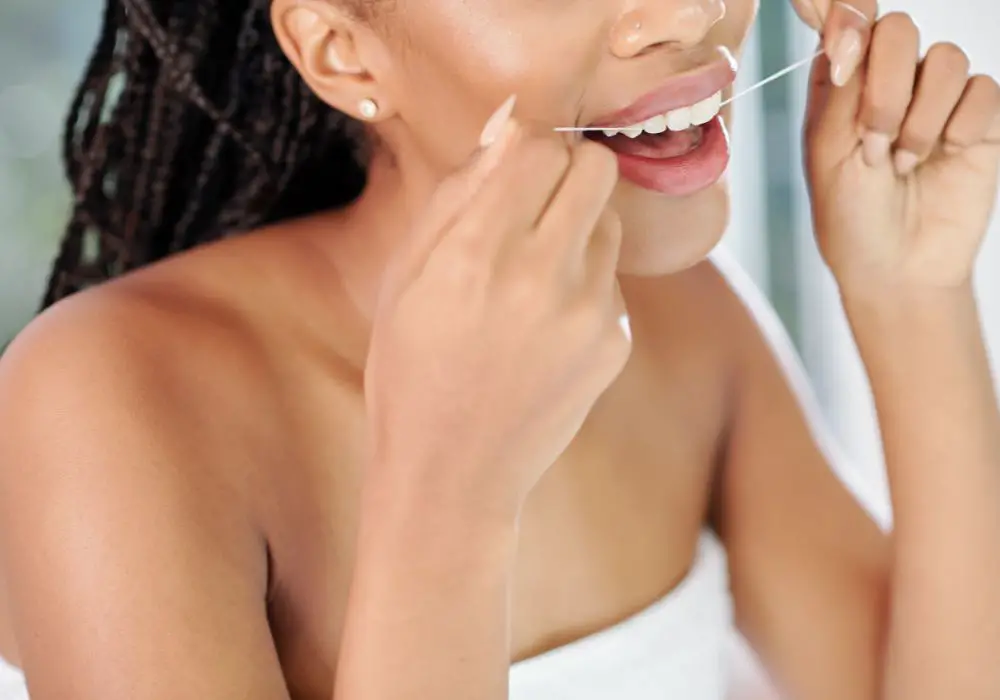
Now that we have discussed unnatural methods of stopping dental bone loss. Let’s have a look at what you can do naturally and cost-effectively!
1. Practice Good Oral Hygiene
The root cause of dental bone loss is poor hygiene. If you clean your teeth regularly and properly, there’s no way bacteria will collect in your mouth and trigger gum disease. So, the most effective way to stop dental bone loss is to focus on your oral health.
Brush your teeth with a soft-bristled toothbrush and fluoride toothpaste twice a day. You can also try other toothpastes but fluoride is commonly known for:
- Strengthening the enamel,
- Preventing bacteria attacks, and
- Reducing sensitivity.
Please note brushing alone isn’t sufficient. Many food particles get stuck between our teeth, which can cause plaque buildup. So, you should use dental floss too.
2. Visit the Dentist Regularly
Most people skip routine dental checkups because they think their teeth are healthy. But dental problems are often hidden from plain sight. You won’t notice a decaying tooth until a sharp pain wakes you up in the middle of the night.
Similarly, you won’t know about dental bone loss until one of the teeth starts loosening. Visiting the dentist regularly can help you identify potential issues and treat them before things get worse.
It’s also a good idea to get professional deep cleaning after every 6 months. In this session, your dentist will use scaling and root planning techniques to clean the tooth surface from the root to the top.
3. Improve Your Diet
Both osteoporosis and hormonal changes are the most common causes of bone loss in females. So, if you’re a woman (especially in your early 40s or 50s), pay special attention to your diet.
Focus on eating vitamin and calcium-rich foods like:
- Dairy products (cheese, yogurt, etc)
- Egg yolks
- Salmon
- Spinach and other leafy vegetables
If you can’t decide what to eat, consult a dietitian to help you design a food plan for dental bone loss. The expert may also suggest some supplements for bone health and tissue regeneration.
4. Quit Smoking & Vaping
Smoking and vaping aren’t healthy habits. The inhaled vapor contains harmful substances (like nicotine) that can restrict the blood flow to the gums and increase the risk of gum disease. It can also cause mouth cancer, which can lead to permanent dental bone loss.
FAQs
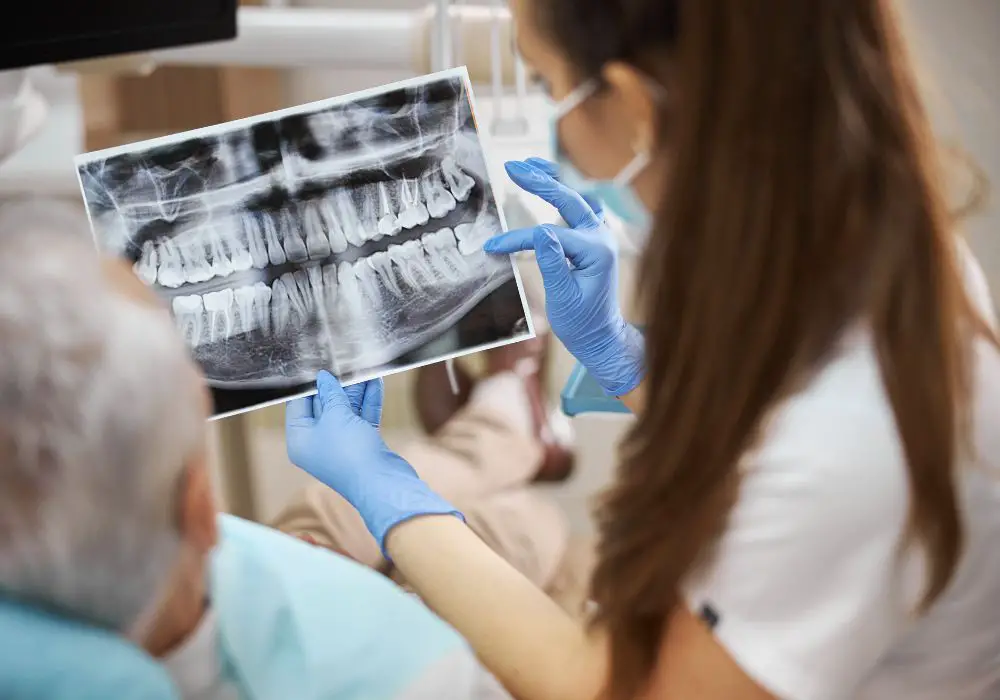
1. How can I restore my tooth bone loss naturally?
Unfortunately, you cannot restore the lost dental bones. You can only slow down or stop the condition from worsening. If you want to do this naturally, focus on oral hygiene, improve your diet, visit the dentist regularly, and quit smoking.
2. Is dental bone loss normal with age?
Dental bone loss is common with age because most people develop osteoporosis or go through intense hormonal changes as they grow old.
But this does not mean age causes dental bone loss. If you take care of your health, it’s possible to have perfect teeth even when you’re 65+!
3. Can braces help with bone loss?
Although there is little research on this aspect, braces correct teeth misalignment and TMJ dysfunction. This can potentially increase your bone density and prevent dental bone loss.
Summary
To recap, here’s how to stop dental bone loss naturally:
- Practice good oral hygiene (brushing, flossing, and mouthwash)
- Visit the dentist regularly for checkups and deep cleaning
- Improve your diet by eating more calcium-rich foods
- Quit smoking and vaping
If your dental bone loss is more severe, opt for professional treatments like bone grafting, implants, or composite bonding.

